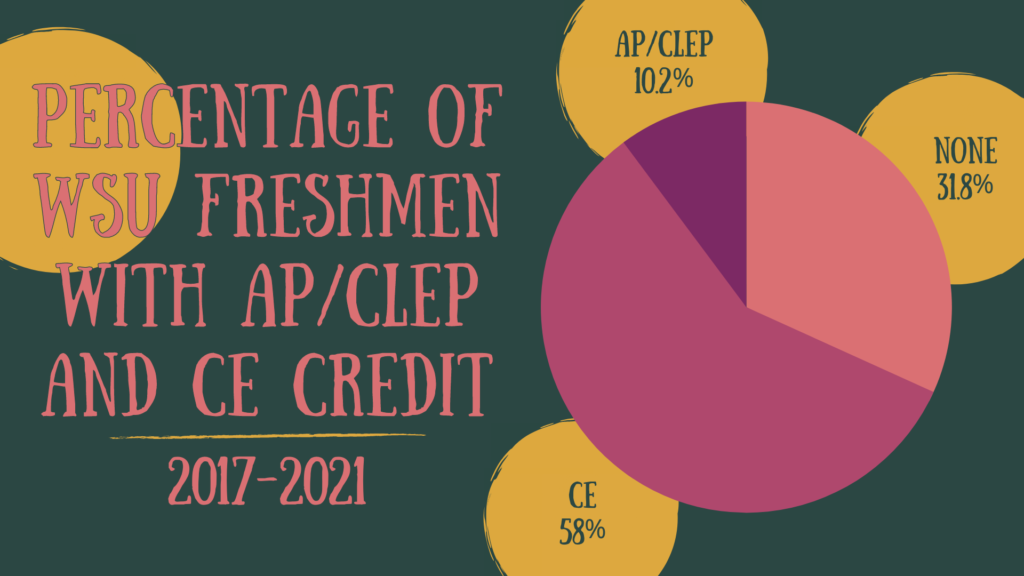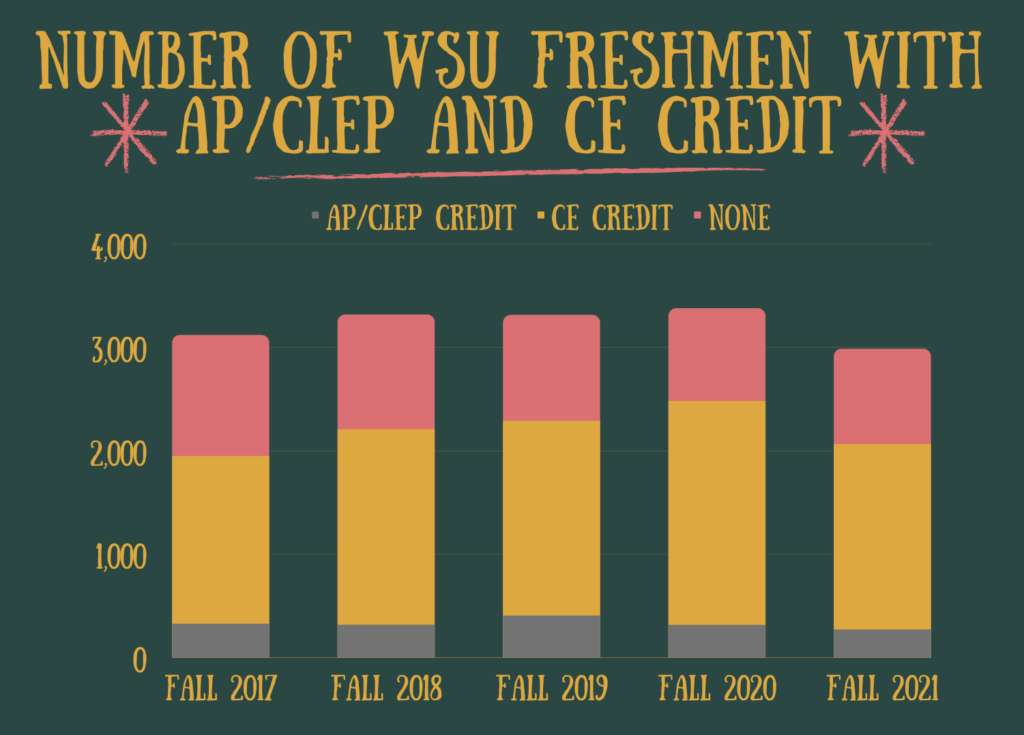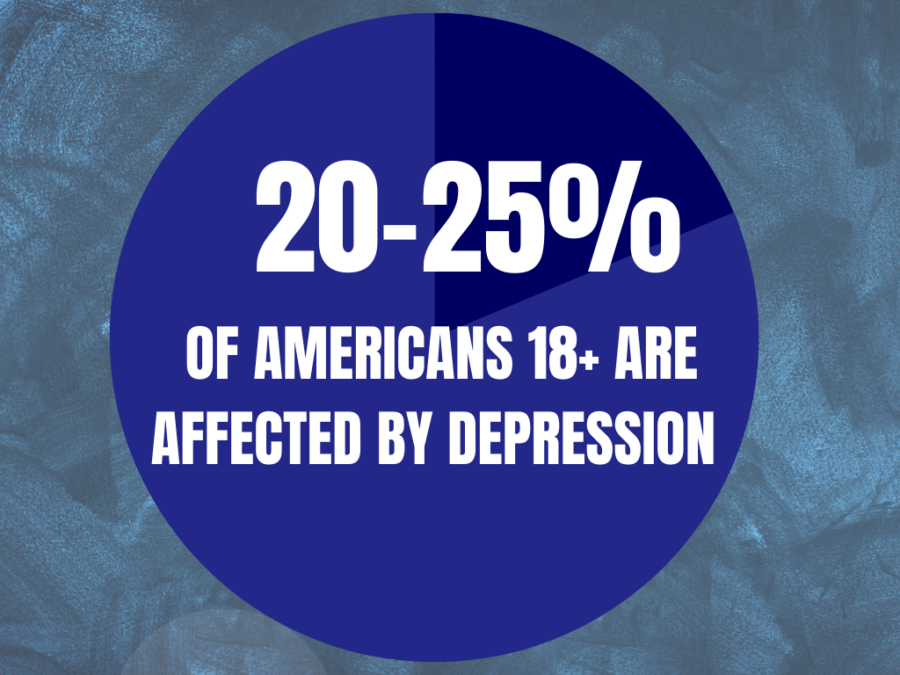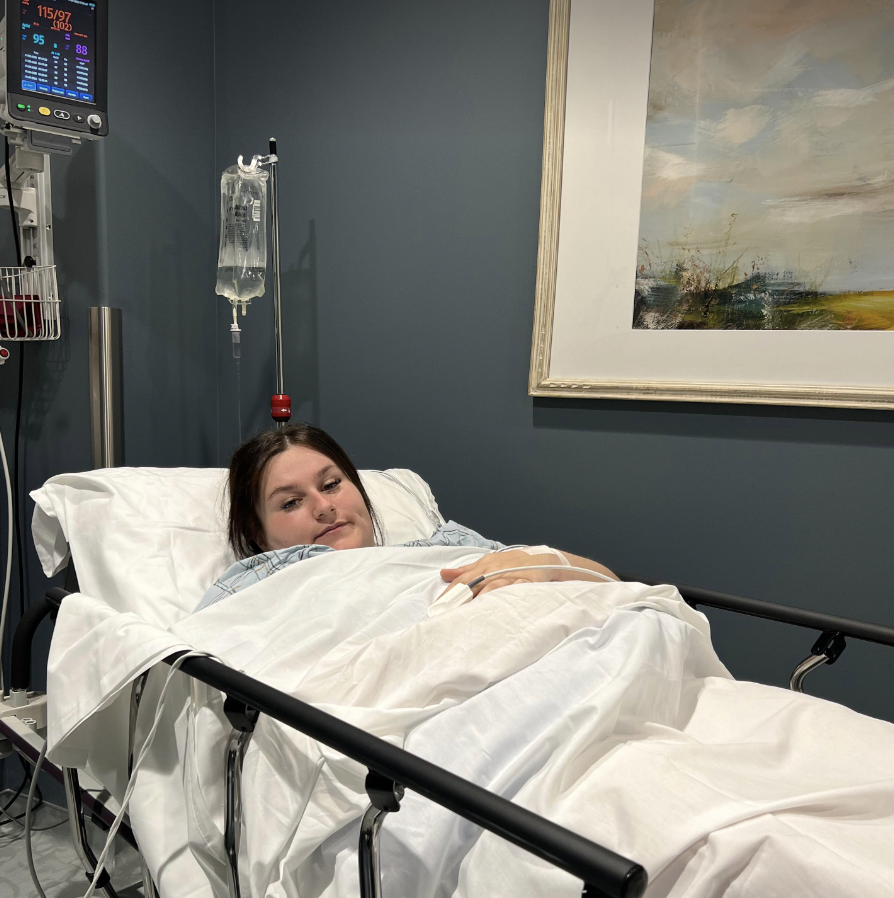Around 200 Utah high schools offer Advanced Placement classes, and over 20,000 Utah students take these classes every year, according to the Utah State Board of Education. In these classes, a single end-of-year exam can earn students college credits.

Over the past five years, about 10% of Weber State freshmen have started their college careers with AP credits.
AP classes are a big part of many high school students’ education, especially those who plan on going to college, but are they worth it?
WSU’s academic departments decide the credits earned for each exam, and in 2021-22, Weber offered credit for 36 different AP exams.
Generally, AP students have “some sort of college ambition,” according to WSU freshman Karina Barboza, who graduated from Weber High School in 2021. She said most of her AP classmates were “high-achieving” and had GPAs above 3.0.
WSU junior Casey Wheeler, who graduated from Weber High in 2018, said there was more variety in the types of students who took AP classes her sophomore year, but by the time she was a senior, “there were a lot more determined and driven students.”
Holly Leake, AP and CE English teacher in the Weber School District, said her AP students are generally more interested in the subject and are willing to dive deeper.
“There’s something about it that has piqued their interest,” Leake said.
The Cost of AP
While schools offer AP classes as part of students’ regular schedule, the tests to get college credit are not free, and that can be a problem for some students. The College Board, which provides the tests, charges $96 per exam, according to their website.
In addition to the exam fee, WSU charges an additional one-time $10 recording fee to add those results to a student’s transcript, according to Andy Young, director of WSU admissions operations.
“When you sign up for the exam, you can list several schools that you want the score sent automatically to,” Young explained. “When the scores arrive at Weber State, we add them to a student’s records in the student information system.”
WSU dual enrollment adviser Richard Leary said this high cost can be prohibitive to underserved populations like first-generation students and those who have a low socio-economic status.
“Maybe $96 is a couple of weeks of groceries for their family,” Leary said. “But for some families, that’s nothing, you know?”
The cost of the exams wasn’t an issue for WSU senior Alyssa Foxley, who graduated from Ogden High School in 2018. She took six AP exams in high school, and her parents were in a financial position to be able to pay for the tests for her.
“I was lucky enough I didn’t have to worry about coming up with that money on my own,” she said.
However, Foxley said because of her parents’ generosity, she took the tests for granted.
“I still studied,” Foxley said, “but because it wasn’t coming out of my own wallet, it kind of took a little bit of pressure off.”
The $96 exam fee, while expensive for some, is still less than WSU tuition. For one three-credit hour class, WSU charges $916.68 to in-state students, which is almost 10 times the cost of the AP exam.
AP vs. Concurrent Enrollment

However, there is an alternative to AP: concurrent enrollment. High school students can take CE classes, which give both high school and college credit, through WSU for only $5 per credit hour.
Although it may seem like CE classes cost less money, some students don’t consider that many classes require students to purchase textbooks, which could bring the cost of the class up.
“Honestly, your textbook could cost you that much easily in any class. So, cost-wise, it’s not necessarily a trade-off,” Leake said.
Despite this, Leary said the dual enrollment advisers try to bridge the equity gap between high school students from different backgrounds by encouraging CE classes over AP to students who are concerned about the cost of college or the AP exam.
Unlike AP classes, where everything hinges on the exam score, with CE classes, “The grade you get is the grade you get,” Leary said. He encourages students to take one or two, and finds that students realize, “Oh, I can do college, and it’s cheap when I do it in high school.”
In fact, 58% of freshmen over the past five years have come to WSU with concurrent enrollment credit — almost six times the number of students with AP credit.
Leake has seen a recent uptick in students choosing CE over AP, with more CE class options being added and fewer sections of AP offered.
“People are lazy and they’re scared of taking any chances on anything, so it’s not shocking to me at all,” Leake said. “I think that we are discouraging anything that’s strengthening kids anymore. We’re just teaching them how to find the easy paths and how to not take a chance.”
In Leake’s experience, CE students are often less interested in the subject and are focused on getting the college credit.
“The kids in concurrent enrollment are trying to get that English credit out of the way before they get to college,” Leake said. “They’re just trying to check a box.”
Despite the prevalence of CE courses, many high school students still choose to take AP classes, even though the class structure and dependence on the end-of-year exam may be detrimental to students’ learning experience.
Wheeler said AP courses’ reliance on preparing for the end-of-year exam was overwhelming.
“You would learn a lot, but it was never really focused learning,” Wheeler said. “It was just kind of like, ‘Well, we’re just going to study everything that happened in U.S. history and hope it’s on the test.’”
WSU junior Clara Holt, who graduated from Syracuse High School in 2018, struggled with the testing aspect of her combined AP English Literature and AP English Language class.
“If you’re not a good test taker, since the entire class relies on a test, it can be a lot harder,” Holt said. “You have to put in a lot more work.”
Leake said AP tests are actually good for students because it gives them a chance to demonstrate their competence.
“I think that it’s a challenge that you that you put yourself through,” Leake said. “Even if you’re not wholly successful, is still makes you stronger because you did it.”
Even though AP tests may teach valuable skills, many students still don’t want to risk not passing.
Wheeler also took CE classes in high school and said the CE grading scale is a major benefit. “You can get, like, a C in the class and still get college credit,” she said.
However, high scores on AP exams often give credit for more than one college class, while CE classes only give credit for one, Foxley pointed out.
Extra Work
The consensus seems to be that in order to pass the test, students have to make a significant effort.
“Most of my homework came from my AP classes,” Wheeler said. “It depends on the class, but the ones that I passed, I had to put in a lot of work to do it.”
Barboza took AP math and physics classes, but did not pass the end-of-year exams. While retaking these courses in college, she had a much better experience than she did in high school.
“I was able to pass the class just fine,” she said. “It was pretty easy, actually, compared to AP.”
According to Barboza, the amount of work she needed to put in to pass her AP classes was far greater than for her college classes.
“I did not nearly have as much of the workload that I had in AP, and the college classes that I have right now weren’t nearly as stressful,” she said. “Yeah, it was challenging with the content, but it was not as stressful in terms of turning in homework on time or testing and that sort of thing.”
While Barboza admits the workload often depends on the class, a lot of her frustration with AP classes came from the homework. For her AP U.S. History class, she described reading “very long” textbook chapters and being required to turn in detailed notes taken in a very specific way.
Learning Outcomes
While these accelerated courses are more work and students may be frustrated by the end-of-year exams, they may also lead to greater learning, students and teachers say.
Wheeler described being able to help her friends in regular high school classes with their homework because she “was learning a lot more.”
Holt said she usually didn’t have to try very hard to get good grades in high school, and AP classes were an adjustment. She said this transition to more intensive coursework helped prepare her for the workload in her college classes.
“That taught me how to put forth the work and actually learn from my reading,” she said.
Foxley said AP classes taught her a lot about herself. “I learned that I could do hard things and that tests weren’t the end of the world, you know?” she said.
AP classes also helped Foxley overcome her tendency to procrastinate and taught her how to take good notes in class.
“I took really good notes so that I could go back and review and make sure I had everything I needed to know for the end-of-the-year test,” she said.
What about the students who fail the AP exam? Are they just out of luck? Even if students earn a 1 or 2 on an AP exam, which are not considered passing scores, the College Board says they still experience benefits.
These students “have better college outcomes than academically similar college students who did not take an AP course and exam” and are more likely to enroll in college, a June 2021 report from the College Board found.
More specifically, these students are “well-prepared to succeed in introductory college coursework” and many of them will “take further AP courses and score higher,” the report says.
College Readiness
Although AP classes teach skills that may come in handy in college, Wheeler said they may go too far.
“A lot of times you can kind of, like, for lack of a better term, B.S. your way through a lot of [college] classes,” Wheeler said. “You can’t really do that in AP classes. I feel like AP classes aren’t an accurate representation of what college is actually like.”
While Wheeler’s AP teachers often had a “no excuses” policy, she has found that her college professors have been more lenient because they know students have busy lives.
Even if WSU students earn credit for their AP English exams, they still have to take English 2010 or 2015. Despite learning some valuable skills in her AP class, Holt found she wasn’t prepared for English 2010 and had to take it twice.
“I had to put a lot more work into that class than I did in the English classes in high school or my AP class,” she said.
A major component of her AP class was learning how to write timed essays to prepare for the exam, which Holt says hindered her in college.
“A downside of having taken the AP classes is I learned that I could write a relatively good essay in an hour,” she said, which caused her to procrastinate her college assignments.
Because of the focus on speed, Holt said her AP class didn’t teach her how to edit her essays.
“On the test, you have one try; you don’t get to go back and edit your paper,” she explained.
Holt learned more in her college English classes “because there wasn’t a huge focus on the test,” she said. “I’m actually learning and getting information and practicing different writing styles.”
This isn’t the case in Leake’s experience. She said taking AP English classes gives students a full year to learn and explore, while CE classes, which are only one semester, are more rushed. AP leads students to be stronger and more ready for their subsequent college courses, Leake said.
Advice

For high school students with college ambitions, especially those planning on going to WSU, Barboza recommends taking CE classes over AP. She said the reason she’s able to graduate within two years is because of all the CE credits she earned in high school.
“My sister is currently taking AP right now, but by the time she turns 16, I’m telling her to do concurrent enrollment, because it’s going to be a lot easier on her and a lot less stressful compared to AP, where your focus is mainly on turning in all of your homework on time,” Barboza said.
For those who decide to take AP classes, Barboza advises them to take classes about topics they know they’ll be interested in, since that makes the experience more enjoyable.
Whether students take AP or CE, Wheeler said it can help them explore their interests.
“It helped focus me more on what path I wanted to take,” she said. “I took a variety of AP and concurrent enrollment classes, and that kind of helped me explore, get college credit and to figure out what I actually wanted to do with my adult life.”
Foxley said her teachers made a big difference in how much she enjoyed her AP classes. “Those are some of the classes that I enjoyed the most,” she said. “I felt like the teachers knew their stuff and they were very approachable.”
However, every school and teacher are different, so Foxley recommends researching the teachers beforehand by talking to friends who have taken classes from them before.
Worth it?
All things considered — the cost, workload and comparison to CE — are AP classes worth it?
“I think it’s worth it if you feel confident you’re going to pass the test,” Wheeler said. “I didn’t pass three of the ones I didn’t put in all the work for.”
Foxley said students should know what they’re getting into beforehand.
“They have to be willing to put in the work prior to the test, too, so that the test doesn’t amount to nothing,” she said.
Another factor to consider is whether or not a student will actually need those credits for their degree.
While Leary and the dual enrollment advisers try not to discourage those high school students who really want to take AP classes from doing so, he said he makes sure students know the information on what’s going to work best with their intended major.
“We have a lot of students who sometimes take AP calculus, but they plan to be a history major,” he said. “That’s way too much, you know, unless they want to. Of course, we never dissuade it.”


















